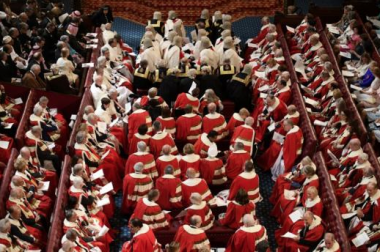Lords Committee critical of extreme NI abortion regime in second report

The Secondary Legislation Scrutiny Committee, which scrutinises legislation parliament has granted the Government power to introduce, has released a new report highlighting even more concerns with the extreme regulations.
Chief among the Committee's new criticisms is that neither the current set nor the former set of abortion regulations, imposed on Northern Ireland, have been introduced without the scrutiny or approval of MPs or Peers.
The report notes that while "no services have been formally commissioned in Northern Ireland" some abortion provision has been made available, as confirmed by a recent disclosure which revealed at least 129 babies have been aborted under the new extreme abortion regime.
It suggests MPs may wish to press the Minister for Northern Ireland, Robin Walker, about the extent of the service provision since 1 April 2020 – something they will have a chance to do later today (Monday 8 June 2020).
The House of Lords Committee also raises significant concerns from the Lord Brennan QC, and leading barrister, Ian Leist QC who have questioned the legitimacy of the extreme abortion regime.
In a submission to the House of Lords Committee the pair described last month's decision to re-table the regulations four months after the restoration of the Northern Ireland Assembly as "constitutionally indefensible".
They add: "The Government should not have re-tabled but should instead be asking parliament to repeal Section 9. This again is a matter of fundamental legal and political importance that I would suggest must be brought to the attention of the House."
Repealing section 9 of the regulations would give the people of Northern Ireland the power to decide its own abortion legislation.
In addition to the submissions made in the first report, which highlighted overwhelming opposition to the regulations and condemned how they came about, this second report references further critical submissions.
Abortions for cleft lip?
Following the launch of a Bill seeking to clarify cleft lip, cleft palate and club foot are not grounds for abortion, new submissions from Carla Lockhart MP and Sir Edward Leigh MP have highlighted how the extreme regulations in Northern Ireland won't prevent abortions being performed for such conditions.
Carla Lockhart said: "This is discrimination based solely on disability… I believe human being extends to those in the womb (notably, the term is more expansive than the term 'person' which some suggest does not cover those in the womb), and allowing abortion for disability clearly does not treat those in the womb with disabilities equally."
Sir Edward Leigh said: "As a Member of Parliament for England, I find it incredibly distressing that the UK Government legally permits disability-selective abortion at a time period where the law recognises that babies are capable of being born alive. What makes this worse is that the UK Government is imposing a similar discriminatory law on Northern Ireland."
'Women are less protected'
In a separate submission, Lord Brennan QC highlights how protections for women from being coerced into abortions have been weakened with the new regulations and open them up to coercive abortions.
He said: "Women are less well protected from coercive abortions in Northern Ireland today than anywhere else in the UK. Moreover, they are far from compliant with Article 39 of the Istanbul Convention which requires signatories to prohibit coercive abortion.
"Again, the fact that these Regulations inexplicably do not deal properly with coercive abortion makes them politically and legally important. These Regulations consequently give rise to issues of public policy that are certain to be of interest to the House."
Lack of conscience protections is discriminatory
Lord Brennan, Lord Alton, Baroness O'Loan and pro-life groups Both Lives Matter and NI Voiceless have all highlighted the lack of adequate conscience protections in the legislation. It could mean some healthcare professionals could be forced to participate in abortion procedures or face losing their jobs.
Lord Alton of Liverpool said the new legislation discriminates against doctors, healthcare professionals, administrative and managerial staff and puts them
in a position where they may be disadvantaged in their employment opportunities because of their views on abortion.
Abuse of power
Right To Life UK also raised a number of problems with the regulations, showing how "the UK Government went far beyond what they were legally required to when laying these regulations, despite the restoration of the Northern Ireland Executive in January".
A spokesperson for Right to Life UK, Catherine Robinson said: "These regulations legalise sex-selective abortion and introduce abortion for babies with disabilities including cleft lip, club foot and Down's syndrome to birth. They introduce defacto abortion-on-demand to Northern Ireland through to 24-weeks.
"They also open up abortion provision to midwives and nurses. This goes much further than the law In England and Wales, where abortions can only be performed by a doctor and the Abortion Act requires the approval of two doctors before an abortion can be performed.
"This influential Committee has twice chosen to draw these regulations to the special attention of the House, reporting on a number of serious issues with the regulations.
"MPs at Westminster must take on board these criticisms, as they debate the regulations today ahead of a vote later this month."











